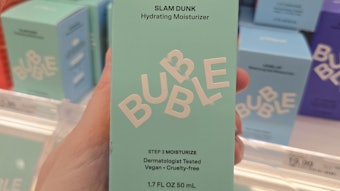
When it comes to skin's microbiome, innate bacteria are not the only actors influencing skin condition. As it turns out, bacteria in the surrounding environment also can improve barrier function, elasticity and skin brightness. Kaoru Kasahara explained in this video interview recorded at the IFSCC Congress in Munich.
"The relationship between skin condition and the surface bacteria everyone has has been reported, such as acne and Propionibacterium acnes," explained Kasahara. "However, [this time we found a] relationship between skin condition and environmental bacteria that everyone does not have. Women with good skin condition had farmland and plant-rich area bacteria. [We therefore] encourage people to incorporate plants into their lives, as this could be a new approach to healthy skin."
"We measured the skin condition (e.g., TEWL) of 293 people and identified their bacteria. We then sorted the subjects by skin condition and [screened] the bacteria related to their skin condition. We found, for the first time, 26 [environmental] bacterial species that were related to skin barrier function; 14 related to skin brightness; and 12 related to skin elasticity.
"The 'good skin condition' group had significantly more outdoor-derived bacteria than indoor ones."
"Next, we sorted through the bacteria’s natural environment using a bacteria database and compared their origin. For each skin parameter, we found the amount of bacteria coming from indoor and outdoor environments and found that the 'good skin condition' group had significantly more outdoor-derived bacteria than indoor ones.
"We then compared which outdoor environments were related to good skin condition and determined that they were predominantly from farm- or plant-associated environments. This suggests that bacteria from farms or plants could promote good skin condition."
"To determine the amount of plant or farm bacteria associated with specific lifestyles, we asked the women to complete a survey, and we found the women who incorporated plants into their daily life had significantly more of the skin-beneficial bacteria derived from plant or farm-associated environment.
"Lastly, farm-originated M. Aerilata, which was related to skin barrier function—i.e., one of the 26 identified to improve TEWL tests, indicating good barrier function—[was isolated] to test its mechanism [of action]. It was added to the normal human epidermal keratinocyte [in vitro] and we saw an improvement in tight junction structure and skin barrier function.
"We encourage people to incorporate plants into their life, and this could be a new approach to healthy skin."
"So, we have shown that farmland and plant-rich area-related bacteria were associated with good skin condition, and may promote skin barrier, elasticity and brightness. "We have also shown that lifestyle is one of the major factors in the amount of those bacteria, so we encourage people to incorporate plants into their life, and this could be a new approach to healthy skin.
"In the future, we plan to 1) test which farmland and plant environments are most suitable to give skin-beneficial bacteria; and 2) investigate the mechanism of environmental bacteria in more detail."










